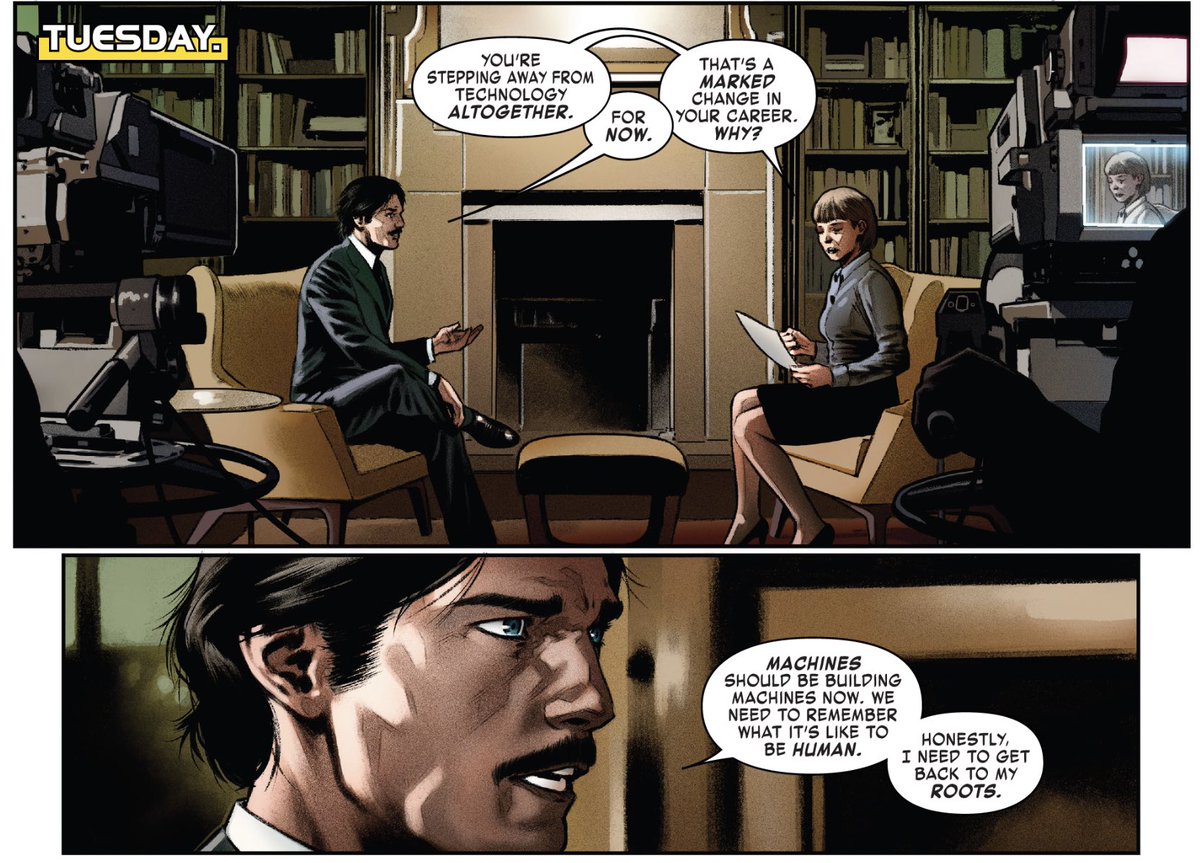
This week, I discuss at @EscapistMag about how #StrangeNewWorlds demonstrates the limits of allegory.
In its eagerness to retreat to the nostalgia of nineties "Star Trek", "Strange New World" eagerly shoves Spock back in the celluloid closet.
escapistmagazine.com/star-trek-stra…
In its eagerness to retreat to the nostalgia of nineties "Star Trek", "Strange New World" eagerly shoves Spock back in the celluloid closet.
escapistmagazine.com/star-trek-stra…
This week's episode of #StrangeNewWorlds is about how gender non-conforming individuals lie about their identities to trick people.
And the humanitarian crisis at the border is a ruse orchestrated by criminal gangs to infiltrate/invade.
It's not good.
escapistmagazine.com/star-trek-stra…
And the humanitarian crisis at the border is a ruse orchestrated by criminal gangs to infiltrate/invade.
It's not good.
escapistmagazine.com/star-trek-stra…
In many ways, this is a retreat for the #StarTrek franchise, particularly during Pride and particularly when trans rights are under attack.
During the nineties, the franchise could only approach gender/sexuality through metaphor, not directly.
them0vieblog.com/2016/02/11/sta…
During the nineties, the franchise could only approach gender/sexuality through metaphor, not directly.
them0vieblog.com/2016/02/11/sta…
This wasn't a clever choice because allegory and metaphors were better ways of dealing with things like gender or identity.
It was because the people in charge of the franchise actively fought against seeing gay/trans characters in "Star Trek."
salon.com/2001/06/30/gay…
It was because the people in charge of the franchise actively fought against seeing gay/trans characters in "Star Trek."
salon.com/2001/06/30/gay…
Part of the issue with treating LGBTQ+ themes through allegory is that it tends to present them as things that are "elastic" or "debatable."
They can also lead to some... questionable implications. As with the infamous "Enterprise" episode about AIDS.
them0vieblog.com/2015/04/20/sta…
They can also lead to some... questionable implications. As with the infamous "Enterprise" episode about AIDS.
them0vieblog.com/2015/04/20/sta…
You know what the best "Star Trek" episode about racism is?
It's not "Let That Be Your Last Battlefield", which is a metaphor for how maybe both the people oppressing and the people being oppressed should calm down.
It's "Far Beyond the Stars."
them0vieblog.com/2017/04/05/sta…
It's not "Let That Be Your Last Battlefield", which is a metaphor for how maybe both the people oppressing and the people being oppressed should calm down.
It's "Far Beyond the Stars."
them0vieblog.com/2017/04/05/sta…
And, you know what?
"Deep Space Nine" understood this back in 1999. "Chimera" is an episode that's largely about how angry the production team are at being unable to just acknowledge that LGBTQ+ people... exist.
them0vieblog.com/2017/08/14/sta…
"Deep Space Nine" understood this back in 1999. "Chimera" is an episode that's largely about how angry the production team are at being unable to just acknowledge that LGBTQ+ people... exist.
them0vieblog.com/2017/08/14/sta…
And, look, I have my issues with "Discovery." Goodness knows that I do.
But you know what was great? The show acknowledging that queer people exist. Not metapors. Not analogues.
Just actual people. Their existence wasn't a teachable moment, it just was.
advocate.com/television/201…
But you know what was great? The show acknowledging that queer people exist. Not metapors. Not analogues.
Just actual people. Their existence wasn't a teachable moment, it just was.
advocate.com/television/201…
"Discovery" featured a trans character marrying a non-binary character. Not a metaphor for a trans character marrying a non-binary character.
It felt like the "Star Trek" franchise was actually making forward progress after running in place for decades.
variety.com/2020/tv/news/s…
It felt like the "Star Trek" franchise was actually making forward progress after running in place for decades.
variety.com/2020/tv/news/s…
This is what's really frustrating about "The Serene Squall" it reduces LGTBQ+ stuff back to metaphor, so we don't actually have to talk about Spock's queerness directly - because that might make some viewers uncomfortable.
If you want to make Spock queer, there's precedent.
If you want to make Spock queer, there's precedent.

While the show pats itself for doing this, it makes the non-binary character - played by a prominent trans actor - into somebody lying about their identity to gain access to spaces they shouldn't get into.
It's not a great look, especially not now.
time.com/4314896/transg…
It's not a great look, especially not now.
time.com/4314896/transg…
Meanwhile, the plot of the episode is based around the idea that a humanitarian crisis "on the border" is just a ruse organised by criminal gangs disguising themselves as advocates for the dispossessed.
Again, not a great look, especially now.
newsweek.com/what-caravan-p…
Again, not a great look, especially now.
newsweek.com/what-caravan-p…
Again, "Picard" is a show with very serious problems - believe me - but at least it went out of its way in its second season to make it clear that human rights abuses related to immigration were bad.
Which you'd assume would be fairly straightforward.
escapistmagazine.com/star-trek-pica…
Which you'd assume would be fairly straightforward.
escapistmagazine.com/star-trek-pica…
It is clear that "Strange New Worlds" wants to take "Star Trek" back to the nineties. And some fans are very happy for that to happen.
It marks a return to, for example, the paranoid politics of immigration seen in "Voyager" episodes like "Displaced."
them0vieblog.com/2016/12/19/sta…
It marks a return to, for example, the paranoid politics of immigration seen in "Voyager" episodes like "Displaced."
them0vieblog.com/2016/12/19/sta…
Similarly, "The Serene Squall" seems to have a similar view to "Day of Honour" from "Voyager", arguing that stories of poor dispossessed and victimised refugees are just traps to ensnare bleeding heart idealists.
It is the nineties, all over again.
them0vieblog.com/2017/01/13/sta…
It is the nineties, all over again.
them0vieblog.com/2017/01/13/sta…
Watching the first season of "Strange New Worlds", particularly after the twofer of "Lift Us Where Suffering Cannot Reach" and "The Serene Squall", it seems the show's conservatism is more than just aesthetic.
Then again, we are revisiting the nineties.
them0vieblog.com/2017/09/12/tru…
Then again, we are revisiting the nineties.
them0vieblog.com/2017/09/12/tru…
Anyway, I guess I can confirm - without spoilers - that next week's episode of "Strange New Worlds" is slightly better, at least.
• • •
Missing some Tweet in this thread? You can try to
force a refresh







